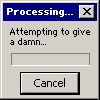Fan Solo wrote:Sorry but as inconsistent the FIA may be, let the stewards & the governing bodies make the decision - it is not the place of the media to decide who is guilty or not as even you may not have all the information.
I tend to
agree that there's a slight but decisive difference in reporting news and reporting opinion, there's a slight but decisive difference in reporting argumentation and stating an argument. In fact that division, when applied well, makes whatever medium one's using much more effective. Stating opinion as opinion, when well founded, can be very effective and completely acceptable when put in its right context. The simplest rule of thumb might well be that when there's even the slightest doubt whether to post something under "news" or "opinion", then it's always opinion. All news can be referenced somewhere else than the person reporting the news.
Lately there has been the tendency, in politics and business, to "make" one's own news. Material is sleekly produced and delivered for free to news outlets, most of whom post, print or put that material on air "as is". This is no doubt at least partly because of a lack of temporal, human and financial resources to excercise sufficient scrutiny of sources etc. Also, for example, both liberal and conservative media in the US have blurred the news/opinion line (IMHO) and essentially compromised themselves to be purposefully taken advantage of by those who should only be the subjects of news. In the end that position is untenable and it's already showing that that's how newsmakers themselves risk becoming the subject of news later on. This does no favours to the basic function and relevance of news organisations themselves and overall I'd much prefer fewer news if they were produced more independently and with a certain disregard for what every other news outlet/pr firm is doing.
Different news organisations have their codes of ethics and conduct. They're well worth exploring for anyone interested in media, and also of use when pondering the relationship between messageboards, blogs and news, for example. Even strict codes of ethics allow a wide range of expression. E.g. BBC recently casually listing what actions
usually have proved effective in peaceful civil uprisings with regard to what events have taken place in Burma. Fully referenced information to be applied as the recipient sees fit. A few examples of such codes (there are many more to be found):
http://www.bbc.co.uk/guidelines/editorialguidelines/
http://www.npr.org/about/ethics/
http://www.spj.org/ethicscode.asp


